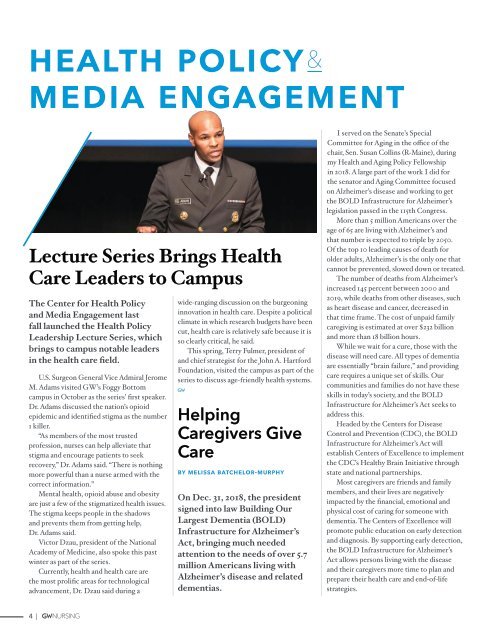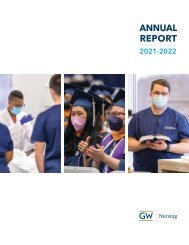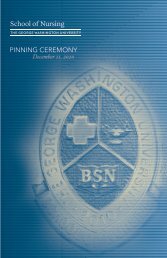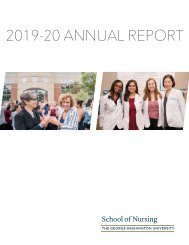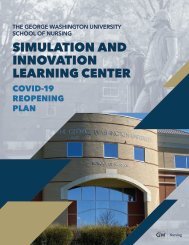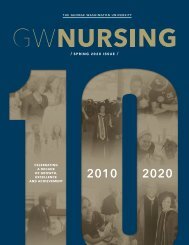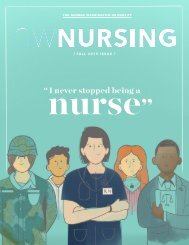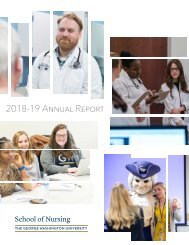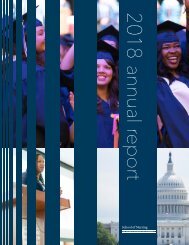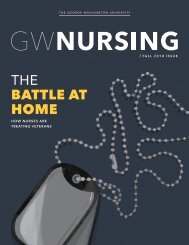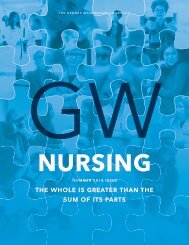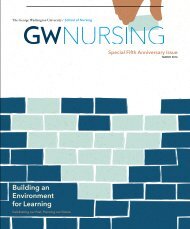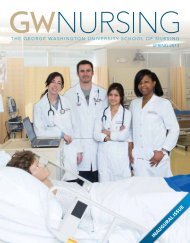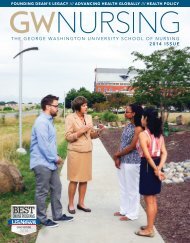GW Nursing Magazine Spring 2019
GW Nursing is a publication of the George Washington University School of Nursing. The magazine tells the story of GW nurses and their endeavors in the areas of education, research, policy and practice.
GW Nursing is a publication of the George Washington University School of Nursing. The magazine tells the story of GW nurses and their endeavors in the areas of education, research, policy and practice.
You also want an ePaper? Increase the reach of your titles
YUMPU automatically turns print PDFs into web optimized ePapers that Google loves.
health policy&<br />
media engagement<br />
Lecture Series Brings Health<br />
Care Leaders to Campus<br />
The Center for Health Policy<br />
and Media Engagement last<br />
fall launched the Health Policy<br />
Leadership Lecture Series, which<br />
brings to campus notable leaders<br />
in the health care field.<br />
U.S. Surgeon General Vice Admiral Jerome<br />
M. Adams visited <strong>GW</strong>’s Foggy Bottom<br />
campus in October as the series’ first speaker.<br />
Dr. Adams discussed the nation’s opioid<br />
epidemic and identified stigma as the number<br />
1 killer.<br />
“As members of the most trusted<br />
profession, nurses can help alleviate that<br />
stigma and encourage patients to seek<br />
recovery,” Dr. Adams said. “There is nothing<br />
more powerful than a nurse armed with the<br />
correct information.”<br />
Mental health, opioid abuse and obesity<br />
are just a few of the stigmatized health issues.<br />
The stigma keeps people in the shadows<br />
and prevents them from getting help,<br />
Dr. Adams said.<br />
Victor Dzau, president of the National<br />
Academy of Medicine, also spoke this past<br />
winter as part of the series.<br />
Currently, health and health care are<br />
the most prolific areas for technological<br />
advancement, Dr. Dzau said during a<br />
wide-ranging discussion on the burgeoning<br />
innovation in health care. Despite a political<br />
climate in which research budgets have been<br />
cut, health care is relatively safe because it is<br />
so clearly critical, he said.<br />
This spring, Terry Fulmer, president of<br />
and chief strategist for the John A. Hartford<br />
Foundation, visited the campus as part of the<br />
series to discuss age-friendly health systems.<br />
Helping<br />
Caregivers Give<br />
Care<br />
by melissa batchelor-murphy<br />
On Dec. 31, 2018, the president<br />
signed into law Building Our<br />
Largest Dementia (BOLD)<br />
Infrastructure for Alzheimer’s<br />
Act, bringing much needed<br />
attention to the needs of over 5.7<br />
million Americans living with<br />
Alzheimer’s disease and related<br />
dementias.<br />
I served on the Senate’s Special<br />
Committee for Aging in the office of the<br />
chair, Sen. Susan Collins (R-Maine), during<br />
my Health and Aging Policy Fellowship<br />
in 2018. A large part of the work I did for<br />
the senator and Aging Committee focused<br />
on Alzheimer’s disease and working to get<br />
the BOLD Infrastructure for Alzheimer’s<br />
legislation passed in the 115th Congress.<br />
More than 5 million Americans over the<br />
age of 65 are living with Alzheimer’s and<br />
that number is expected to triple by 2050.<br />
Of the top 10 leading causes of death for<br />
older adults, Alzheimer’s is the only one that<br />
cannot be prevented, slowed down or treated.<br />
The number of deaths from Alzheimer’s<br />
increased 145 percent between 2000 and<br />
<strong>2019</strong>, while deaths from other diseases, such<br />
as heart disease and cancer, decreased in<br />
that time frame. The cost of unpaid family<br />
caregiving is estimated at over $232 billion<br />
and more than 18 billion hours.<br />
While we wait for a cure, those with the<br />
disease will need care. All types of dementia<br />
are essentially “brain failure,” and providing<br />
care requires a unique set of skills. Our<br />
communities and families do not have these<br />
skills in today’s society, and the BOLD<br />
Infrastructure for Alzheimer’s Act seeks to<br />
address this.<br />
Headed by the Centers for Disease<br />
Control and Prevention (CDC), the BOLD<br />
Infrastructure for Alzheimer’s Act will<br />
establish Centers of Excellence to implement<br />
the CDC’s Healthy Brain Initiative through<br />
state and national partnerships.<br />
Most caregivers are friends and family<br />
members, and their lives are negatively<br />
impacted by the financial, emotional and<br />
physical cost of caring for someone with<br />
dementia. The Centers of Excellence will<br />
promote public education on early detection<br />
and diagnosis. By supporting early detection,<br />
the BOLD Infrastructure for Alzheimer’s<br />
Act allows persons living with the disease<br />
and their caregivers more time to plan and<br />
prepare their health care and end-of-life<br />
strategies.<br />
4<br />
|


